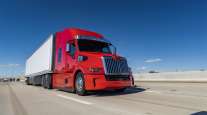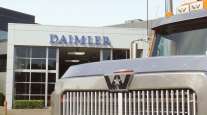Executive Editor
Daimler Automation Head Says Collaboration Key to Tech’s Success

[Stay on top of transportation news: Get TTNews in your inbox.]
LAS VEGAS — The leader of Daimler Truck North America’s autonomous technology division said the path to self-driving trucking will advance through partnerships like those her company has forged, and believes the outcome of such collaborations will ultimately benefit motor carriers.
“You have to work so closely together on the integration,” Joanna Buttler, head of DTNA’s global autonomous technology group, said during a Feb. 1 media briefing from the Manifest conference. “Having a partner you can work with day in and day out on the entire development cycle — from really defining the requirement to validating the system — is critical. You don’t do that by just giving someone your series production truck and letting them install and integrate the system.”
DTNA is following a two-pronged approach to autonomous development; it is developing an in-house system with its independent subsidiary, Torc Robotics, and working with Waymo as that company develops an integrated autonomous-driving system of its own with DTNA. Both are based on the Freightliner Cascadia.
Buttler echoed confidence that has been expressed by Daimler Truck global head Martin Daum in its autonomous development partners.

Daum
“I feel very confident in what we’re offering, and the two partners we are working with,” she said. “We have here at least two of the four to five players in the market in our portfolio.”
Still, she acknowledges that it’s a competitive sector.
“We expect there to be other players in the market, and I think that is good because we know it is a viable technology in the market,” Buttler said. “The market is big enough for everyone to have a piece of that cake.”
As it relates to DTNA working with two partners, Buttler believes that pursuing more than one option for automated driving ultimately will benefit fleets. That could be especially true, she said, if differences in specific performance characteristics become apparent.
We expect there to be other players in the market, and I think that is good because we know it is a viable technology in the market.
Joanna Buttler, head of DTNA's global autonomous technology group
“Since both of these technologies are in development, it’s going to be hard for me to say [what] is exactly going to be the differentiators,” she said. “What are the factors for the performance of a virtual driver? Is it uptime? Reach? Where are they operated? There could be differences in the operation of each of the virtual drivers, and having that choice in the portfolio is, in our mind, important for our customers.”
Buttler added, “One could do it more fuel-efficient, the other one could do it in a better time, the other one could potentially reach a different destination. I think there could be some differentiating factors. Whoever has the best performance, best efficiency, best uptime, will be the leading offering in the market.”
Joanna Buttler leads the Global Autonomous Technology Group. She will be responsible for the global autonomous technology strategy, including vehicle programs, global rollout & strategic partnerships.
https://t.co/V225WF0pQt pic.twitter.com/U1pouX3slS — Daimler Truck AG (@DaimlerTruck) November 17, 2022
She added, “Our customers are so smart, and they run their businesses so tight. Like with any new technology, they will tell us what the best option is.”
Buttler stressed, however, that safety must be at the forefront for all developers of automated technology.
“What is the nonnegotiable, and where no one should try to differentiate is the safety aspect. Make it from A to B safely, no one gets hurts. That is absolutely the gold standard for anyone who wants to enter this market,” she said.
With those goals in mind, in the longer term Buttler said DTNA aims to be a broad-based industry provider of autonomous technology.
“Our vision is to be propulsion and software provider agnostic for the end goal, but for the now we want to stay very focused with our two partners that we have,” she said. “As you can imagine, we are still in the development phase, and this is a marathon.”

Host Seth Clevenger speaks with Torc Robotics CEO Peter Vaughan Schmidt about the realities of autonomous truck technology and how they fit into the freight transportation industry. Hear the program above and at RoadSigns.TTNews.com.
Second of a three-part series on autonomous vehicles. Hear Part I here. Part III coming Feb. 2.
Part of that marathon will be convincing lawmakers and regulators that automated trucks are safe for roads, and this is an area where Buttler said DTNA already is investing resources.
“We have a dedicated regulatory affairs person on our team, who is really that voice — the voice of reason and the voice of our industry,” she said. “We are doing that in front of regulators, and actively partnering with other AV companies to really dispel some of those statements that are out there.”
Buttler added, “The minimum requirement for all of us is doing this safely. No one wins in this market if any of the other providers has an incident. Doing this together, and safely and speaking with one voice, but also being responsible in the development is very important.
“We use that opportunity, through our regulatory affairs group, to partner and come together with the entire industry to ensure that we all have the same view.”
Want more news? Listen to today's daily briefing below or go here for more info:



